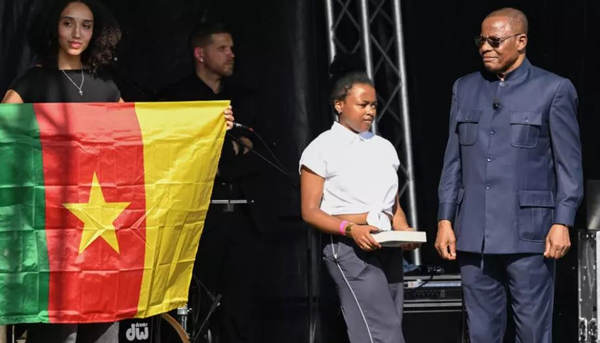Maurice Kamto’s Paris Rally: Mocked by the Regime, Echoed by a Nation Hungry for Change

In a charged political season where every gesture is magnified, Maurice Kamto’s rally on May 31 at Place de la République in Paris has sparked a storm of reactions—both admiration and contempt.
As the flagbearer of the Alliance Politique pour le Changement (APC) in the upcoming 2025 presidential elections, Kamto’s decision to address the diaspora from outside national borders was not just tactical—it was necessary.
His critics, however, saw things differently.
A Meeting or a Mockery? The Ruling Party Responds
The most pointed reaction came from Grégoire Owona, Minister of Labour and Social Security and Deputy Secretary-General of the ruling Cameroon People's Democratic Movement (RDPC). On social media, Owona dismissed the event as “minable,” scoffing at the “millions” allegedly promised by organizers and citing what he estimated to be less than 5,000 attendees.
He was particularly scathing about Kamto’s pledge to protect President Paul Biya and his family if elected. “What protection do they need?” Owona asked. “Are they in danger now or will they be in the future?”
Echoing the tone, Jean de Dieu Momo, Minister Delegate at the Ministry of Justice, called the declaration “childish and ridiculous.”
But Kamto’s defenders swiftly responded, reminding critics that holding such rallies within Cameroon has become nearly impossible for opposition figures. Meetings are often banned or violently dispersed, leaving the diaspora stage as one of the few platforms where genuine political dialogue and mobilization can take place.
Kamto and the “Eleventh Region”: A Political Vision Rooted in Inclusion
Far from an act of exile, Kamto’s rally in Paris symbolized his continued engagement with a diaspora often sidelined in Cameroonian political discourse. He doesn’t treat overseas citizens as mere ballots, but as a vital part of the nation’s voice—a notion he encapsulated by referring to them as Cameroon’s “11th region.”
More than political theater, the event sought to restore hope among citizens estranged by years of repression and systemic failure. Kamto listens, he connects, and above all, he reclaims the dream that a Cameroon beyond dictatorship and division is still possible.
This approach resonates deeply with a generation that has grown disillusioned with a state apparatus increasingly defined by its fear of dissent and its unwillingness to share power. In this context, Kamto’s words in Paris weren’t just promises—they were provocations against the stagnation that has defined Biya’s 43-year rule.
Paul Biya: A Presidency in Shadows
Against the backdrop of Kamto’s rising appeal, haunting images from Paul Biya’s 2022 appearance at the U.S.–Africa Summit resurface, showing a visibly confused and fatigued leader. At 92 years old, Biya’s presence at public events is rare and often troubling.
But the real issue isn’t his age—it’s the system propping him up, manipulating a frail figure to maintain its grip on power. As many Cameroonians have pointed out, it’s not Biya’s endurance that is impressive, but rather the endurance of the elite clinging to him, even as the nation suffers.
This isn't a governance structure; it’s a marionette show, staged for survival.
The Blood Cost of Control
Let’s not forget the true price of this regime’s hold on power:
-
The mysterious deaths of figures like Monseigneur Benoît Balla, journalist Bibi Ngota, and Martinez Zogo.
-
The bloody repression of peaceful protests and marches, particularly by Kamto’s own MRC party.
-
The ongoing Anglophone crisis, which has killed over 6,000, displaced more than 765,000, and driven 70,000 into exile in Nigeria alone.
-
The unanswered repression during the 2008 hunger riots, and the constitutional silence over the right to protest.
These are not campaign talking points. These are open wounds on a nation desperate for healing.
Between Mockery and Mobilization: What's Really at Stake?
Critics laugh at Kamto's numbers in Paris. But isn’t the real mockery a regime that can only govern through fear, censorship, and military boots? The regime calls the meeting “minable,” but when was the last time an opposition leader in Cameroon held a rally without riot police waiting outside the venue?
This is the cruel irony of Cameroonian politics: the opposition is blamed for going abroad, yet kept in chains at home.
2025: A Battle Beyond Ballots
As the world watches, 2025 is shaping up to be a defining moment for Cameroon. The ruling elite hopes that fatigue, fear, and cynicism will win out. But Kamto is betting on a different force: the will of the people.
To paraphrase Abraham Lincoln, you can fool all the people some of the time, and some of the people all the time—but you can’t fool all the people all the time.
Cameroonians are waking up. And they must remember Lincoln’s other enduring truth:
“The ballot is stronger than the bullet.”
Final Word
Whether in Paris, Buea, or Garoua, the message is the same: Cameroon belongs to its people, not to the legacy of a tired regime or the ambitions of those hiding behind it. Let the ruling party mock if it must. But mockery doesn’t stop momentum.
2025 isn't about personalities. It's about possibility. And that possibility lies not in old tricks, but in new courage.
The real question now isn’t whether Kamto’s rally drew a million or five thousand.
The real question is: how many Cameroonians will finally decide that enough is enough?
- Details
- News Team
- Hits: 2529
